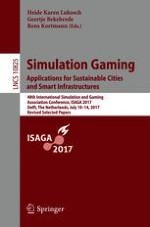2018 | OriginalPaper | Chapter
Assessment of Hybrid Board Game-Based Learning Outcomes Using the Beatty Theoretical Framework
Author : Abby Muricho Onencan
Published in: Simulation Gaming. Applications for Sustainable Cities and Smart Infrastructures
Publisher: Springer International Publishing
Activate our intelligent search to find suitable subject content or patents.
Select sections of text to find matching patents with Artificial Intelligence. powered by
Select sections of text to find additional relevant content using AI-assisted search. powered by
